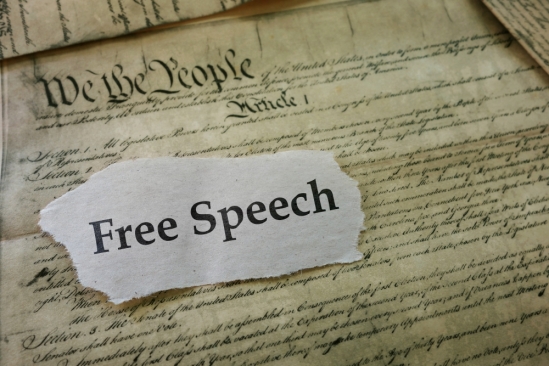This op-ed was published on ADN.com Feb. 8.
On Feb. 2, the ACLU of Alaska finalized an historic settlement with the State of Alaska on behalf of two Alaska Psychiatric Institute doctors who were fired in 2018 for putting their patients before politics and refusing to pledge their allegiance to incoming Dunleavy administration. But last week, Jahna Lindemuth, the former attorney general under Gov. Bill Walker, urged the Legislature to refuse to fund the settlement, arguing that it would be illegal to do so. Lindemuth, who had no involvement in the lawsuit and who had nothing to do with the settlement, is mistaken.
The settlement caps a significant First Amendment victory that vindicated the free speech rights of public employees after a federal court ruled last October that the firings violated the doctors’ constitutional rights. The result is a sizable monetary award to the two plaintiffs, but more importantly, the settlement makes it clear that no future governor, or anyone else in state government, can take a politically motivated employment action against a non-policymaking employee because of their political affiliation or beliefs. This important language protects a large swath of public employees in terms that would not have been possible if the case had gone to trial.
But because the settlement does not hold Gov. Mike Dunleavy and his then-chief of staff Tuckerman Babcock personally responsible for paying the $495,000 award, some, like Lindemuth, are unhappy that these two individuals are not suffering financial consequences for their official actions. According to Lindemuth, because part of the court’s October ruling denies Dunleavy and Babcock immunity, they should be solely responsible for the consequences and the State of Alaska would unjustly enrich them by paying their debt. She’s flat wrong.
The fact is, the State of Alaska has always been responsible for the damages in this case. As lead counsel for the API doctors, I should know. We named the state as a defendant in the lawsuit just the same as Dunleavy and Babcock. Why? Because the State of Alaska was their employer. The state’s agreement to pay the settlement is part of a routine practice in litigation because the law makes employers liable for illegal firings. And if one looks carefully at the settlement agreement, at the claims we brought to court, and at the court’s October decision, it’s obvious that without settlement we were headed to a costly trial that would expose the state to thousands more in damages and attorneys’ fees.
That the State of Alaska pays the costs of settling cases in which it is a party is nothing new. In the past two years alone, the Legislature appropriated millions of dollars to pay for settlements and judgments in lawsuits where the state was one of the defendants. In one such instance, the Legislature approved almost $5 million for a single case. In another, the Legislature appropriated more than $75,000 to pay Kelly Parker, who also sued Dunleavy and the state when she too was fired for refusing to pledge her allegiance to the new administration, just like the API doctors. Those settlements, including Parker’s, were approved without fanfare or outrage.
What’s more, contrary to the impressions generated by Lindemuth, the state routinely steps in and assumes legal responsibility when one of its employees is sued. Under Alaska Statute 09.50.253, the state normally “substitutes itself” as a party in a lawsuit filed against an individual employee. The public policy behind this “take the bullet” protection is clear: Experienced and capable public employees would be hard to find if every act they take could subject them and their families to financial hardship. True, this provision did not apply in this particular case, but the state’s covering the legal liabilities of its employees is routine. To be upset that Dunleavy and Babcock are not hung out to dry personally is one thing. But to suggest that public funds being used to settle this case somehow violates the constitution is a misleading, misinformed statement that could have dangerous consequences.
The State of Alaska has always remained true to its word and appropriated the money when plaintiffs have agreed to settle their cases and give up their rights to vindication before a court or a jury. If the Legislature could simply pick and choose which settlements to honor based on whether they supported the decisions that spurred the lawsuits, what litigants in their right minds would settle their cases against the state in the future? Do we really want those seeking justice to insist on going to trial in every case because the state can’t be trusted? Considered in these terms, it would be an irresponsible breach of fiduciary duty for the State to not pay its debt to the API doctors because of outrage over Dunleavy’s and Babcock’s personal escape from liability.
The loyalty pledge allowed and enforced by the State of Alaska and its leadership, including Lindemuth, was a travesty that not everyone survived. While some were left jobless, others stayed on with closed lips afraid to exercise their right to think and speak freely. Failure to honor the settlement would also be a failure bring justice to those and future employees by nullifying the hard-won constitutional victory this case represents, which in turn would truly let Dunleavy and Babcock off the hook for their incredible abuse of power.
Many have pointed out that this case is another in a line of lawsuits costing the state money for the ill-considered decisions of this administration. That is a valid point, but to deny justice to the doctors is not the solution. It is they, after all, who vindicated the rights of all Alaska public employees by bringing this case. Refusing to fund the settlement would simply be punishing victims of the Dunleavy administration’s game of chess, in which public employees became disposable pawns if they appeared to have the potential to get in the way of the governor’s political agenda. Alaskans have every right to be unhappy with the unlawful actions of their elected officials, but they will not find justice in perpetuating harm to public employees.
Stephen Koteff is the legal director of the ACLU of Alaska, was lead counsel representing the API doctors in the case against Dunleavy, Babcock and the State of Alaska, and has practiced employment law in Alaska for the past 25 years.


